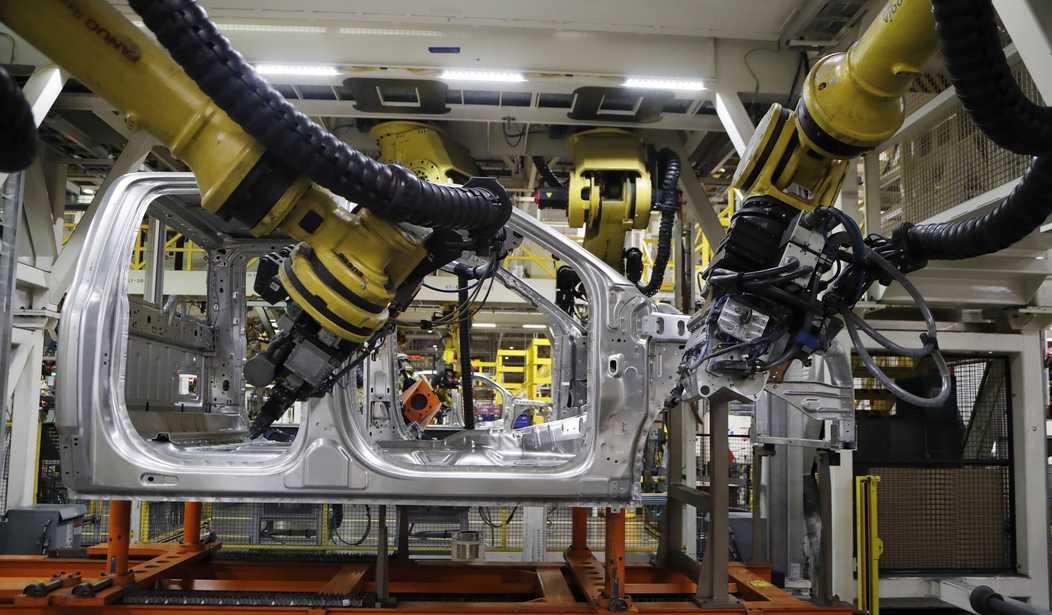Say, remember when we all hailed Ford Motors for refusing to participate in the auto bailout in 2009? How we lauded their independence from government and the fine example of private-sector reliance they demonstrated?
Good times, good times. According to a report from Motor Authority picked up by New Haven's WTNH, Ford plans to develop vehicles that will inform on other drivers who exceed the speed limit on the freeway. They filed a patent application for such a system last year, and the USPTO published it a couple of weeks ago:
A patent application from the automaker titled “Systems and Methods for Detecting Speeding Violations” was published by the United States Patent and Trademark Office (USPTO) Jul. 18 2024, and was originally filed by Ford Jan. 12, 2023.
In the application, Ford discusses using cars to monitor each other’s speeds. If one car detects that a nearby vehicle is being driven above the posted limit, it could use onboard cameras to photograph that vehicle. A report containing both speed data and images of the targeted vehicle could then be sent directly to a police car or roadside monitoring units via an Internet connection, according to Ford.
Industry magazine The Drive also picked up on the report on Friday, and noted an earlier Ford project that also seemed like a challenge for the marketing folks:
The same company that once sought to patent self-repossessing cars, then let that application expire, has a new idea to employ tech in a manner most drivers probably won’t love. A U.S. Patent and Trademark Office submission published July 18 titled “Systems and Methods for Detecting Speeding Violations” describes a way for Ford‘s vehicles to measure the speeds of nearby cars using cameras and sensors, and then potentially report those violations to the police.
The application, which arrives to us by way of Motor Authority, contains a flowchart on page six explaining the logic that would govern the system. As illustrated, cars would constantly be gathering speed data of surrounding traffic, using radar or lidar. If a particular vehicle is determined to exceed a “threshold speed limit” (whether this would be a posted legal limit or otherwise isn’t decided), it would then switch the camera on and begin recording. It would also “determine one or more identifying features of the second vehicle,” to generate a record that may help authorities find it. From there, the data would be sent to additional connected monitoring devices and/or the police, and it’s up to the latter to determine whether to pursue the offending speeder or not.
Man, the ads just write themselves, right? That is, if the ads are for GM, Subaru, Honda, and so on. The ads could be modeled on the famous Macintosh ad from 984 that used George Orwell's famous novel of the same name. Only this time, rather than throwing a sledgehammer at a movie screen, someone could throw a lug wrench at an F-150.
Preferably, that would be at an "all-electric" F-150 Lightning. Not that those will be easy to find, though.
Tom Knighton's aghast at this development, and wonders why Ford even thought to pursue it. Certainly not because drivers are oh so enthusiastic about become government snitches, Tom concludes. Are automakers responding to other incentives than consumer demand?
As I said, no one is asking for this. No one is going to actively seek out a technology like this.
So why is it happening?
Well, I’ve got a theory, and it has to do with another type of consumer product entirely: Table saws.
BLAME THE TABLESAWS! No, wait, that's not what Tom is arguing. A company named SawStop has patented a new safety device that would likely prevent potentially maiming injuries to casual users -- an excellent achievement, although no saw manufacturer chose to license the technology for their own products. SawStop then launched their own safer product, which is great, but then proceeded to push rent-seeking regulation to force competing products off the market unless those products incorporated their safety device:
Now, in fairness to SawStop, they’re willing to let anyone use their patents if the Consumer Products Safety Commission implements such a rule, so they’re not going to necessarily profit off of it—but their very expensive saws become much more competitive. I still oppose this kind of thing and despite SawStop for doing it—seriously, I’ll never buy a product from them because of it—but at least it seems that if there’s a plan to profit from it, they’re being subtle about it.
Yet would Ford do the same?
Probably, but that's not the biggest issue here. We seem to be building a police state into our technology in various and discrete ways, but those tend to add up. The government has been trying to force personal vehicles into partial or total reliance on the electrical grid, which means that government will have greater access eventually into personal driving habits. We have watched the rise of a government/big business Big Brother censorship regime on the Internet and into the marketplace of ideas. The mainstream media has built snitch systems of their own with an archipelago of "fact checkers" and "disinformation" policing. And now our cars may not only rat us out, but rat out anyone else around us -- and perhaps on a far-reaching set of behaviors that go beyond speeding on the highways.
The question isn't whether Ford will follow through on this. It's whether the government will eventually require snitch systems built into all of our new technology. And that should have us questioning where this innovation is leading us.









Join the conversation as a VIP Member